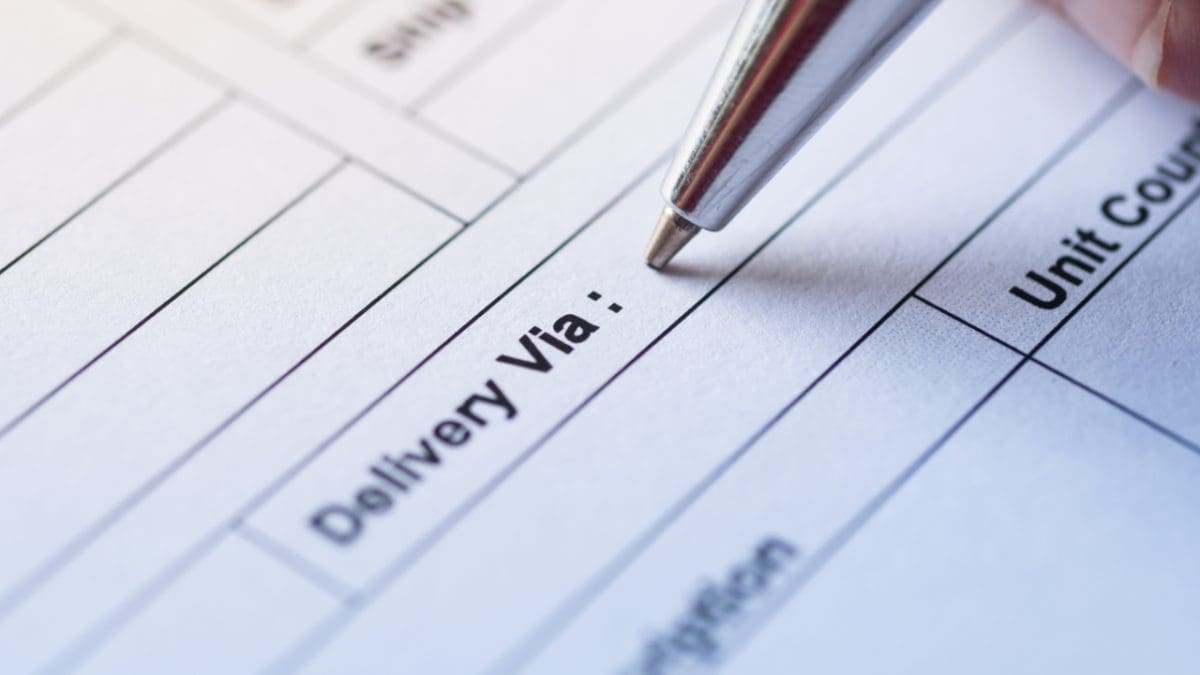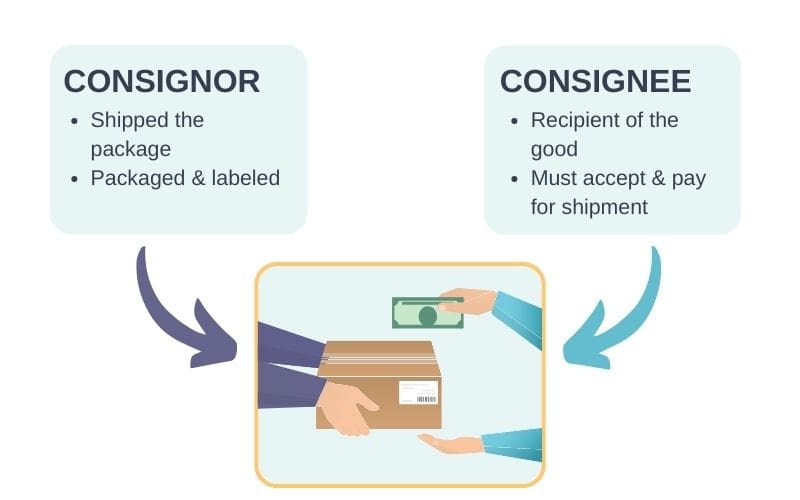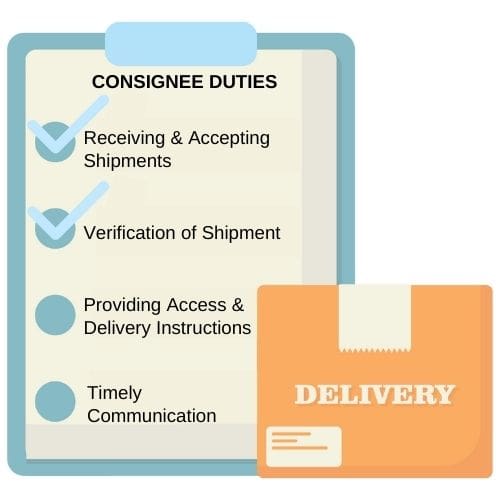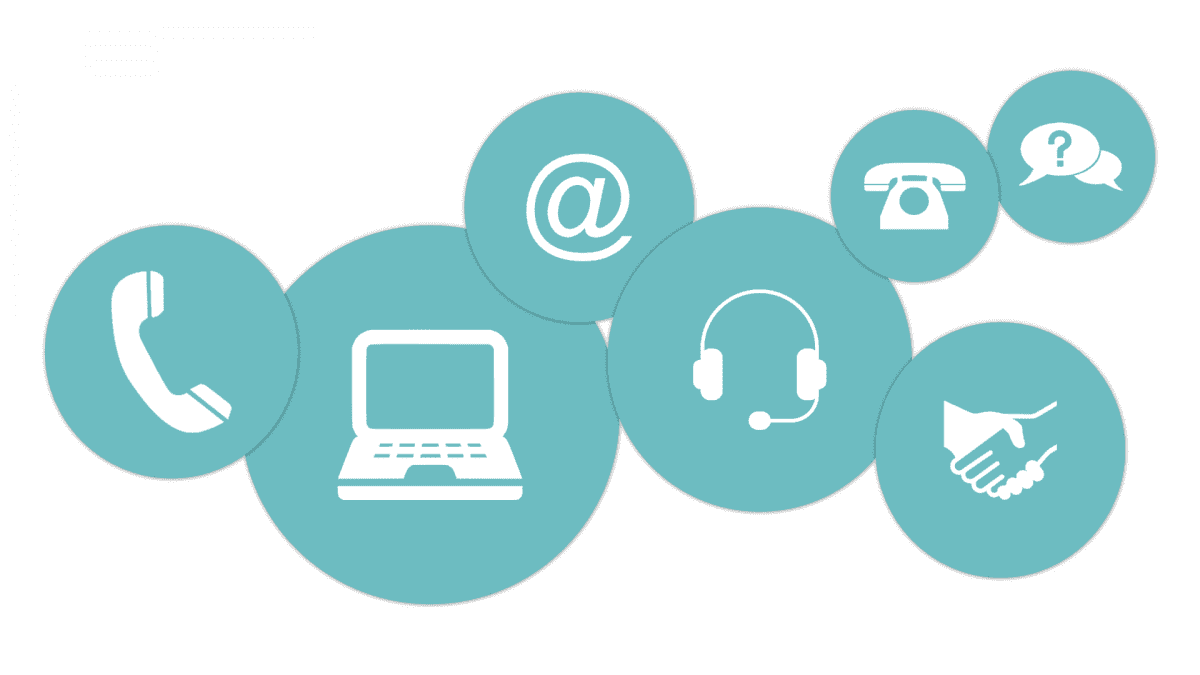
Today’s consumers are accustomed to online shopping and same-day deliveries. For almost all these deliveries, the “last-mile” plays a crucial role in completing them successfully. Ever wonder who’s responsible for ensuring that your eagerly awaited package arrives right at your doorstep, in perfect condition, and just in time?
Meet the consignee—another key player in shipping and logistics. The consignee’s role goes beyond just receiving the package; it’s about coordination, communication, and often, the make-or-break point of the entire delivery process. Today, we’re taking a closer look at consignees to uncover their multifaceted responsibilities, challenges, and opportunities that shape the last-mile delivery process.
What is a Consignee?
A consignee is an individual or entity explicitly named in a shipping contract who is responsible for receiving the shipment.
Example: If you order a laptop online, you are the consignee. The package is shipped with your name on it, and you’re responsible for accepting the delivery.
The consignee is the final destination in the delivery process, but their role extends beyond that simple definition. The consignee must ensure the accuracy and condition of the shipment, provide proper access and delivery instructions, and communicate timely with carriers or delivery personnel. They may also be involved in managing returns, exchanges, or refusals if any issues arise with the shipment.
The relationship between the consignor (sender) and the consignee is often defined by legal and contractual obligations, and the consignee’s responsibilities may vary based on the nature of the goods and the terms of the shipping agreement. When it comes to last-mile delivery, the consignee’s actions can significantly impact timelines, customer experience, and overall satisfaction, making their role a crucial component of modern logistics. As a consignee, you’re legally bound to accept the goods as described in the shipping contract. If the goods are damaged or lost, the consignee may have the right to claim compensation.
What’s the Difference Between Consignor and Consignee?

While the consignee is the receiver of the goods, the consignor is the sender. The consignor initiates the shipping process, whereas the consignee concludes it.
- Consignor: The individual or business shipping the goods. They are responsible for packaging, labeling, and ensuring the shipment reaches the consignee.
- Consignee: The recipient of the goods. They must accept the shipment in accordance with the terms laid out in the shipping contract.
The consignee is an important part of the shipping process, holding both legal obligations and responsibilities that differentiate them from the consignor. This distinction is important in understanding the logistics of shipping, whether you’re sending a gift or running a global business.
Significance of the Consignee in Last-Mile Delivery
Last-mile delivery refers to the final step of a package’s journey from a transportation hub to the end user, often a residential or business address. It’s a crucial phase, representing not just the end of the package’s journey but also the fulfillment of a promise to the customer. The role of the consignee, as the receiver of the shipment, is central to its success. They ensure proper receipt, verify the condition of the goods, and may handle issues like returns or exchanges. This interaction with the consignee is often the most direct contact a business has with the customer during the shipping process, making it vital for customer satisfaction and overall brand reputation.
The consignee is often the end customer themselves. Their interaction with the delivery process is immediate and personal. Whether it’s a consumer receiving a much-anticipated online purchase or a business awaiting crucial inventory, the consignee’s experience can profoundly influence their perception of the entire service. Prompt communication, accurate delivery details, and proper handling directly affect customer satisfaction.
Role in Ensuring Successful Deliveries
The consignee is not only responsible for receiving the package but also for ensuring that the delivery is successful. Their cooperation is required at various levels, such as providing the correct address, being available at the time of delivery, or arranging alternative receipt options if needed. Any miscommunication or failure in these responsibilities can lead to unsuccessful deliveries, affecting both the shipping company’s efficiency and the customer’s satisfaction.
Understanding the importance of the consignee’s role, both from the business and customer perspectives can lead to enhanced shipping experiences.
Responsibilities and Expectations of a Consignee
In shipping and logistics, the consignee’s job is more than just receiving a package. It involves several key responsibilities and expectations that are vital to a smooth delivery process.

- Receiving & Accepting Shipments: The consignee is expected to be available for receiving and accepting the shipments at the specified address. This might include arranging for someone to be on-site if they cannot be present, ensuring a seamless handover.
- Verification of Shipment Accuracy and Condition: Upon receiving the shipment, the consignee’s responsibility extends to verifying that the package is as described, in good condition, and complete. This involves checking the package for any visible damages, confirming the contents match the order, and, if necessary, taking immediate action if discrepancies are found.
- Providing Access and Delivery Instructions: Accessibility can be a crucial factor in successful deliveries. The consignee may need to provide specific instructions or access codes, particularly in gated communities or secured buildings. Clear and detailed instructions enable a smooth delivery and minimize potential delays.
- Timely Communication with Carriers/Delivery Personnel: Open and timely communication with carriers or delivery personnel is key to avoiding misunderstandings or delays. Whether it’s coordinating delivery times or conveying special instructions, proactive communication is an essential aspect of the consignee’s role.
The responsibilities and expectations of a consignee are multifaceted. They act as the crucial link between the delivery process and the end recipient, ensuring that packages are received in the right condition, at the right place, and at the right time.
Consignee’s Role in Exception Handling
Despite our best efforts, not everything always goes as planned. The consignee’s role in handling exceptions—like delivery issues, returns, exchanges, and refusals—is an important aspect that often goes unnoticed but is essential for a successful delivery process.
- Addressing Delivery Issues and Challenges: Delivery challenges can arise from various factors, such as incorrect addresses, absence during delivery attempts, or unexpected obstacles at the delivery location. The consignee must be proactive in communicating and working with the delivery personnel to resolve these issues. Quick and thoughtful action can prevent delays and ensure a smooth delivery process.
- Managing Returns, Exchanges, and Refusals: The consignee also plays a vital role in managing returns and exchanges. If a shipment does not meet the expectations, the consignee must follow the appropriate protocols for returns or exchanges, including maintaining the product’s condition and providing necessary documentation.
The consignee’s role in exception handling is a multifaceted responsibility that requires careful attention, clear communication, and collaboration with shipping and delivery personnel. Whether addressing delivery challenges or managing returns and refusals, the consignee acts as a critical link in ensuring that the shipping process is handled effectively and efficiently. It’s a role that, though often overlooked, can significantly impact the overall customer experience and the success of the entire logistics operation.
Impacts of Consignee Actions on Last-Mile Delivery
The consignee’s actions significantly influence the success of last-mile delivery. Understanding these impacts is essential for both consumers and businesses to create a more efficient and satisfactory delivery experience.
Consignee’s timely responses, clear instructions, and accurate information can streamline the delivery process, ensuring that packages arrive as scheduled. On the other hand, mistakes or miscommunications can lead to delays, throwing off carefully planned timelines and resulting in rescheduling and all the hassle that goes with it.
With a proactive approach, consignees can provide accurate delivery information, and make themselves available for receipt minimizing potential delays and redelivery attempts. Redelivery not only increases costs for the carrier but also frustration for the consignee.
Enhancing Overall Customer Experience
The actions of the consignee can have a big impact on the brand’s overall success. A smooth and timely delivery leads to satisfied customers, positive reviews, and potentially repeat business. Conversely, a poor experience leads to dissatisfaction and negative perceptions of the brand or carrier.
The impacts of consignee actions on last-mile delivery are broad and significant. From affecting delivery timelines to minimizing delays and enhancing customer satisfaction, the consignee’s role is important.
Collaboration Between Consignees, Carriers, and Retailers
Collaboration today between consignees, carriers, and retailers is more important than ever. Seamless coordination and communication among these parties have a big impact on the efficiency and satisfaction of the delivery process.
Effective collaboration requires robust communication channels and tools. Whether it’s through phone calls, emails, or specialized logistics software, consistent communication enables coordination and understanding between consignees, carriers, and retailers. Shared information on delivery schedules, preferences, and special instructions ensures that everyone is on the same page, reducing potential confusion or delays.
Technology plays a vital role in bridging the gap between consignees and carriers. Apps and platforms like Elite EXTRA that allow real-time tracking, notifications, and direct communication with delivery personnel have revolutionized the way consignees interact with carriers. These tools enhance transparency and allow consignees to feel more engaged and in control of the delivery process.
Importance of Data Sharing and Real-Time Tracking
Sharing data and offering real-time tracking is fundamental to modern logistics collaboration. Consignees can monitor their shipments in real time, making necessary adjustments or preparations for receiving. For carriers and retailers, access to consignee preferences and feedback helps in optimizing routes and improving service.
The collaboration between consignees, carriers, and retailers is an intricate dance, facilitated by communication tools, technology, and real-time data sharing. This integrated approach not only streamlines the delivery process but also enhances customer satisfaction and trust. True collaborative efforts are the backbone of a successful last-mile delivery system.

Challenges and Solutions
Challenges can and do arise in last-mile deliveries that impede a seamless experience. Here we’ll explore some common challenges involving missed deliveries, failed communications, security, and privacy, along with the solutions that can address these issues.
Addressing Missed Deliveries and Failed Communications
Missed deliveries and failed communications are common challenges in the delivery process that can lead to frustration and additional costs. This complex issue often stems from miscommunication, lack of coordination, or unexpected changes in scheduling. Solutions lie in implementing clear and timely communication channels between consignees, carriers, and retailers. Real-time tracking and notifications, customizable alerts, and direct communication with delivery personnel can enhance transparency and planning.
Embracing technology and fostering a culture of accountability can significantly reduce the likelihood of misunderstandings and missed deliveries. By investing in communication tools and a customer-centric approach, businesses can create a more reliable and efficient delivery system, building satisfaction and loyalty in an increasingly competitive market.
Overcoming Security and Privacy Concerns
Data privacy is a growing concern for everyone these days. Concerns about privacy and security in the delivery process are valid. Sharing personal information, addresses, and delivery instructions can lead to potential risks. Solutions here involve adopting secure communication platforms and maintaining stringent privacy policies that ensure personal information is handled with care. Investing in encryption technologies and regularly reviewing security protocols can also alleviate privacy concerns.
Challenges in last-mile delivery can be daunting, but with thoughtful solutions, they’re not insurmountable. By focusing on clear communication, leveraging technology, and prioritizing security and privacy, these challenges can be addressed effectively. It’s a continuous process of learning, adapting, and improving that helps build trust and efficiency in the delivery ecosystem.
Conclusion
Last-mile delivery is an intricate process that requires collaboration, communication, and a clear understanding of the roles and responsibilities involved. The role of a consignee is pivotal in ensuring timely deliveries, enhancing customer experience, and addressing potential challenges. As we’ve seen, the consignee’s actions can significantly impact the entire delivery process, from scheduling to exception handling. It’s an area that demands both attention and innovation.
Elite EXTRA’s Routing & Dispatch software is designed to support and simplify this complex process, offering optimized routes, real-time tracking, and 24/7 customer support. Are you looking to enhance your logistics operations and provide a seamless delivery experience for your customers? Contact Elite EXTRA to explore tailored solutions that align with your unique needs.
Sources
https://www.ups.com/us/en/supplychain/
https://www.supplychainbrain.com/blogs/1-think-tank/post/36994-the-challenges-and-solutions-of-data-interoperability-and-integrity-in-smart-supply-chain-infrastructures
https://www.linkedin.com/pulse/logistics-last-mile-delivery-optimizing-final-stretch-rafael-a-vela/







